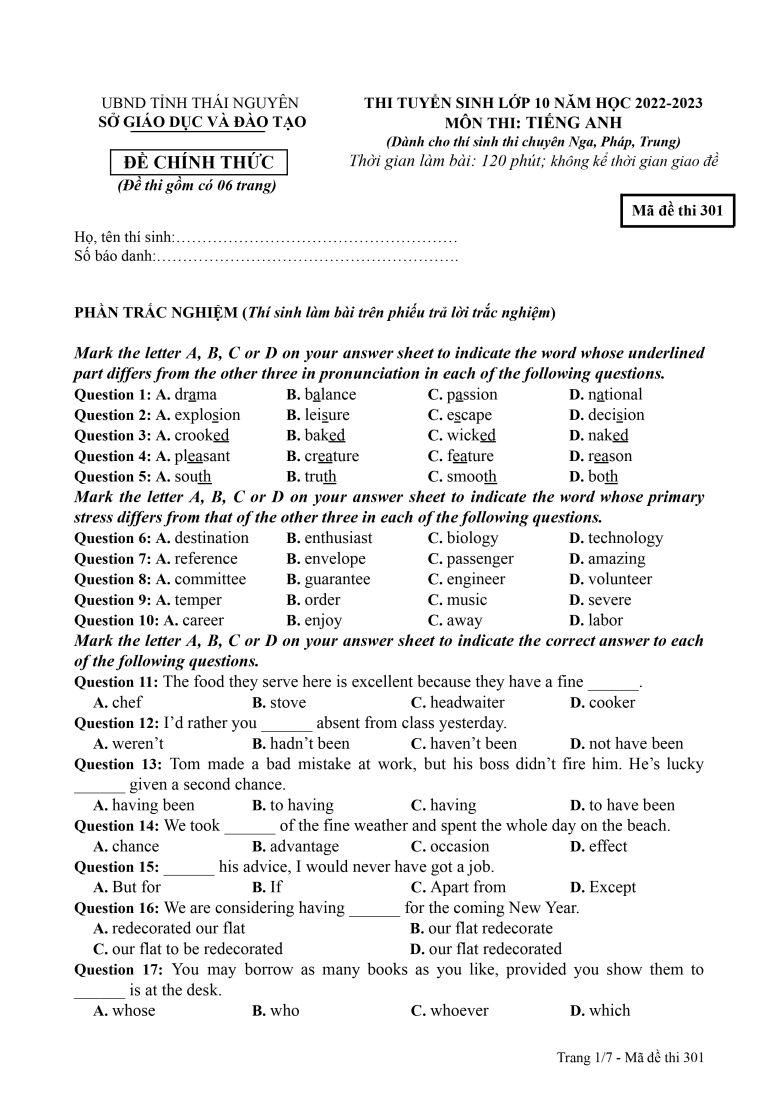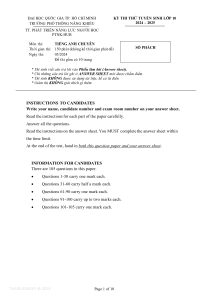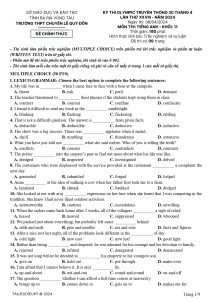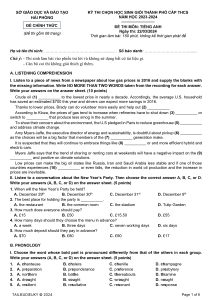Tài liệu diệu kỳ xin giới thiệu đến quý thầy, cô giáo và các bạn học sinh tài liệu ĐỀ THI TUYỂN SINH LỚP 10 THPT CHUYÊN THÁI NGUYÊN NĂM HỌC 2022-2023 MÔN THI TIẾNG ANH (Dành cho thí sinh thi chuyên Nga, Pháp, Trung) có thể tải xuống (download) ở dạng pdf.
Trích dẫn nội dung "ĐỀ THI TUYỂN SINH LỚP 10 THPT CHUYÊN THÁI NGUYÊN NĂM HỌC 2022-2023 MÔN THI TIẾNG ANH (Dành cho thí sinh thi chuyên Nga, Pháp, Trung) ":
UBND TỈNH THÁI NGUYÊN SỞ GIÁO DỤC VÀ ĐÀO TẠO
ĐỀ CHÍNH THỨC
(Đề thi gồm có 06 trang)
THI TUYỂN SINH LỚP 10 NĂM HỌC 2022-2023 MÔN THI: TIẾNG ANH
(Dành cho thí sinh thi chuyên Nga, Pháp, Trung) Thời gian làm bài: 120 phút; không kể thời gian giao đề
Mã đề thi 301
Họ, tên thí sinh:………………………………………………
Số báo danh:………………………………………………….
PHẦN TRẮC NGHIỆM (Thí sinh làm bài trên phiếu trả lời trắc nghiệm)
Mark the letter A, B, C or D on your answer sheet to indicate the word whose underlined part dif ers from the other three in pronunciation in each of the following questions. Question 1: A. drama B. balance C. passion D. national Question 2: A. explosion B. leisure C. escape D. decision Question 3: A. crooked B. baked C. wicked D. naked Question 4: A. pleasant B. creature C. feature D. reason Question 5: A. south B. truth C. smooth D. both Mark the letter A, B, C or D on your answer sheet to indicate the word whose primary stress dif ers from that of the other three in each of the following questions. Question 6: A. destination B. enthusiast C. biology D. technology Question 7: A. reference B. envelope C. passenger D. amazing Question 8: A. committee B. guarantee C. engineer D. volunteer Question 9: A. temper B. order C. music D. severe Question 10: A. career B. enjoy C. away D. labor Mark the letter A, B, C or D on your answer sheet to indicate the correct answer to each of the following questions.
Question 11: The food they serve here is excellent because they have a fine ______. A. chef B. stove C. headwaiter D. cooker Question 12: I’d rather you ______ absent from class yesterday.
A. weren’t B. hadn’t been C. haven’t been D. not have been Question 13: Tom made a bad mistake at work, but his boss didn’t fire him. He’s lucky ______ given a second chance.
A. having been B. to having C. having D. to have been Question 14: We took ______ of the fine weather and spent the whole day on the beach. A. chance B. advantage C. occasion D. effect Question 15: ______ his advice, I would never have got a job.
A. But for B. If C. Apart from D. Except Question 16: We are considering having ______ for the coming New Year. A. redecorated our flat B. our flat redecorate
C. our flat to be redecorated D. our flat redecorated
Question 17: You may borrow as many books as you like, provided you show them to ______ is at the desk.
A. whose B. who C. whoever D. which Trang 1/7 - Mã đề thi 301
Question 18: He came in quietly ______ not to wake the baby up.
A. as if B. such as C. so as D. even if Question 19: In the past, people thought that French was ______ English. A. superior to B. as much superior as
C. more superior D. superior than
Question 20: As far as I’m ______, it’s quite all right for you to leave early. A. concerned B. regarded C. consulted D. bothered Question 21: ______ all of us who are here tonight, I would like to thank Mr. Dunant for his talk.
A. On account of B. In spite of C. On behalf of D. Instead of Question 22: Dr. Richard has ______ a valuable contribution to the life of the school. A. done B. created C. caused D. made Question 23: Mr. David went to ______ school to meet his son’s teacher. A. a B. an C. the D. ø (no article) Question 24: ______ many times I tell him, he always forgets to pass on phone messages. A. Wherever B. Whenever C. Whatever D. However Question 25: The company was so successful during the 1900s that it ______ 2000 new employees in a period of six months.
A. put off B. took on C. caught on D. laid off Question 26: I didn’t know his address, ______ I would have written to him. A. because B. otherwise C. therefore D. nevertheless Question 27: I can’t get that new book anywhere. Can I ______ yours for a day or two? A. borrow B. offer C. present D. lend Question 28: In no ______ could such a discreet man betray our secrets. A. way B. circumstance C. account D. time Question 29: There’s no ______ in going to school if you are not willing to learn. A. aim B. purpose C. point D. reason Question 30: Don’t tell anyone about this, ______?
A. do you B. won’t you C. will you D. should you Mark the letter A, B, C or D on your answer sheet to indicate the underlined part that needs correction in each of the following questions.
Question 31: The test administrator ordered that we didn’t open our books until he told us to do so.
A. test administrator B. that C. didn’t open D. to do so Question 32: Animal researchers have identified many behavioral patterns associated with selecting a place to live, avoiding predators and find food.
A. have identified B. find C. to live D. associated Question 33: Harvey seldom pays his bill on time, and his brother does too. A. his B. does too C. on time D. pays Question 34: Rarely the Park Service allows dogs to visit the national parks, except those kept on a leash at all times.
A. visit the national parks B. at all times
C. the Park Service allows D. except those
Question 35: Jane must have called her brother last night, but she arrived home too late to call him.
A. him B. but C. too late D. must have called Trang 2/7 - Mã đề thi 301
Question 36: You shouldn’t carrying so much cash in your pocket when travelling. A. carrying B. much C. in D. when Question 37: Mrs. Stevens, together with her cousins from New Mexico, are planning to attend the festivities.
A. together with B. to attend C. from New Mexico D. are planning Question 38: When you lived in London, did you use to travelling by bus? A. When B. did you C. travelling D. by bus Question 39: If only I have done the test better than other students did. A. did B. have done C. than D. other Question 40: In order to get married in this state, one must present a medical report along with your identification.
A. In order B. in this state
C. must present D. your identification
Mark the letter A, B, C or D on your answer sheet to indicate the correct preposition or adverb particle to complete each of the following questions.
Question 41: She wasn’t injured but it took her two hours to recover ______ the sock. A. over B. for C. at D. from Question 42: It is unusual ______ him to go out on a Monday night.
A. of B. with C. for D. to Question 43: He sometimes forgets to wind ______ his alarm-clock and then gets to school at the last moment.
A. up B. on C. back D. for Question 44: Children in large families learn how to get ______ with other people. A. through B. away C. across D. along Question 45: This time of day all the lines are engaged, so I doubt whether she’ll be able to ______ to us.
A. get down B. get through C. get about D. get over Question 46: A number of bad contracts and last year’s deep recession finally drove him ______ business.
A. out of B. from C. off D. outside Question 47: I’m afraid there is something wrong ______ my ear. I can’t hear you properly. A. with B. from C. at D. of Question 48: You should not try to ski on your own ______ having a few lessons from a certified instructor.
A. while B. without C. after D. instead of Question 49: I am rather reluctant to use methods which have not been tried ______ before. A. out B. on C. for D. up Question 50: It is a biological fact that children take ______ their parents. A. for B. up C. to D. after Read the following passage and mark the letter A, B, C or D on your answer sheet to indicate the correct answer to each of the questions from 51 to 60.
An eye for detail
Artist Susan Shepherd is best known for her flower paintings, and the large garden that surrounds her house is the source of many of her subjects. It is full of her favourite flowers, most especially varieties of tulips and poppies. Some of the plants are unruly and seed themselves all over the garden. There is a harmony of colour, shape and structure in the two
Trang 3/7 - Mã đề thi 301
long flower borders that line the paved path which crosses the garden from east to west. Much of this is due to the previous owners who were keen gardeners, and who left plants that appealed to Susan. She also inherited the gardener, Danny. ‘In fact, it was really his garden,’ she says. ‘We got on very well. At first he would say, ‘Oh, it’s not worth it’ to some of the things I wanted to paint them, he recognized what I had in mind.’
Susan prefers to focus on detailed studies of individual plants rather than on the garden as a whole, though she will occasionally paint a group of plants where they are. More usually, she picks them and then takes them up to her studio. ‘I don’t set the whole thing up at once,’ she says. ‘I take one flower out and paint it, which might take a few days, and then I bring in another one and build up the painting that way. Sometimes it takes a couple of years to finish.’
Her busiest time of year is spring and early summer, when the tulips are out, followed by the poppies. ‘They all come out together, and you’re so busy,’ she says. But the gradual decaying process is also part of the fascination for her. With tulips, for example, ‘you bring them in and put them in water, then leave them for perhaps a day and they each form themselves into different shapes. They open out and are fantastic. When you first put them in a vase, you think they are boring, but they change all the time with twists and turns.’
Susan has always been interested in plants: ‘I did botany at school and used to collect wild flowers from all around the countryside,’ she says. ‘I wasn’t particularly interested in gardening then; in fact, I didn’t like garden flowers, I thought they looked like the ones made of silk or plastic that were sold in some florists’ shops – to me, the only real ones were wild. I was intrigued by the way they managed to flower in really awkward places, like cracks in rocks or on cliff tops.’ Nowadays, the garden owes much to plants that originated in far-off lands, though they seem as much at home in her garden as they did in China or the Himalayas. She has a come-what-may attitude to the garden, rather like an affectionate aunt who is quite happy for children to run about undisciplined as long as they don’t do any serious damage.
With two forthcoming exhibitions to prepare for, and a ready supply of subject material at her back door, finding time to work in the garden has been difficult recently. She now employs an extra gardener but, despite the need to paint, she knows that, to maintain her connection with her subject matter, ‘you have to get your hands dirty’.
(Adapted from First Certificate in English 3, 2012)
Question 51: In the first paragraph, the writer describes Susan’s garden as ______. A. having caused problems for the previous owners
B. being only partly finished
C. needing a lot of work to keep it looking attractive
D. having a path lined with flowers
Question 52: The word “this” in paragraph 1 refers to ______.
A. the number of wild plants B. the position of the garden C. the harmony of the planting D. the position of the path Question 53: What does Susan say about Danny?
A. He was slow to see the point of some of her ideas.
B. He was recommended by the previous owners.
C. He immediately understood her feelings.
D. He felt she was interfering in his work.
Trang 4/7 - Mã đề thi 301
Question 54: What is Susan’s approach to painting?
A. She spends all day painting an individual flower.
B. She creates her paintings in several stages.
C. She will wait until a flower is ready to be picked before painting it. D. She likes to do research on a plant before she paints it.
Question 55: The word “intrigued” in paragraph 4 is closest in meaning to ______. A. originated B. interested C. interfered D. selected Question 56: Susan thinks that tulips ______.
A. are more colourful and better shaped than other flowers
B. should be kept in the house for as long as possible
C. look best some time after they have been cut
D. are not easy to paint because they change so quickly
Question 57: Why did Susan enjoy studying wild flowers at school?
A. She was attracted by their different colours and shapes.
B. She wanted to learn how to make copies of them in material.
C. She used the lessons as a good excuse to get out of school.
D. She found the way they adapted to their surroundings fascinating.
Question 58: How does the writer describe Susan’s attitude to her garden? A. She prefers planting flowers from overseas.
B. She dislikes criticism of her planting methods.
C. She thinks children should be allowed to enjoy it.
D. She likes a certain amount of disorder.
Question 59: The word “exhibitions” in paragraph 5 is closest in meaning to ______. A. surroundings B. varieties C. displays D. paintings Question 60: What point is Susan making in the final paragraph?
A. It’s hard to do exhibitions if there are not enough plants ready in the garden. B. It’s important not to leave the gardening entirely to other people.
C. It’s good to have expert help when you grow plants.
D. It’s essential to find the time to paint even if there is gardening to be done. Read the following passage and mark the letter A, B, C or D on your answer sheet to indicate the correct answer to each of the questions from 61 to 70.
The biologist’s role in society as well as his moral and ethical responsibility in the discovery and development of new ideas has led to a reassessment of his social and scientific value systems. A scientist can no longer ignore the consequence of his discoveries; he is as concerned with the possible misuses of his findings as he is with the basic research in which he is involved. This emerging social and political role of the biologist and all other scientists requires a weighing of values that cannot be done with the accuracy or the objectivity of a laboratory balance. As a member of society, it is necessary for a biologist now to redefine his social obligations and his functions, particularly in the realm of making judgments about such ethical problems as man’s control of his environment or his manipulation of genes to direct further evolutionary development.
As a result of recent discoveries concerning hereditary mechanisms, genetic engineering, by which human traits are made to order, may soon be a reality. As desirable as it may seem to be, such an accomplishment would entail many value judgments. Who would decide, for example, which traits should be selected for change? In cases of genetic
Trang 5/7 - Mã đề thi 301
deficiencies and disease, the desirability of the change is obvious, but the possibilities for social misuse are so numerous that they may far outweigh the benefits. Probably the greatest biological problem of the future, as it is of the present, will be to find ways to curb environmental pollution without interfering with man’s constant effort to improve the quality of his life. Many scientists believe that underlying the spectre of pollution is the problem of surplus human population. A rise in population necessitates an increase in the operations of modern industry, the waste products of which increase the pollution of the air, water, and soil. The question of how many people the resources of the Earth can support is one of critical importance.
Although the solutions to these and many other problems are yet to be found, they do indicate the need for biologists to work with social scientists and other members of society in order to determine the requirements necessary for maintaining a healthy and productive planet. For although many of man’s present and future problems may be seen to be essentially social, political, or economic in nature, they have biological ramifications that could affect the very existence of life itself.
Question 61: According to the passage, a modern scientist should be more concerned about ______.
A. the consequences of his discoveries B. his basic research
C. other scientists D. the development of new ideas Question 62: The word “it” in paragraph 2 refers to ______.
A. hereditary mechanism B. a reality
C. genetic engineering D. an accomplishment
Question 63: It is implied in the passage that genetic engineering ______. A. will change all human traits B. may do us more harm than good C. is the most desirable for life D. is no longer desirable Question 64: The word “they” in paragraph 2 refers to ______.
A. discoveries concerning hereditary mechanisms
B. cases of genetic deficiencies
C. effects of genetic engineering misuse
D. possibilities for genetic deficiencies
Question 65: What is probably the most important biological problem mentioned in the passage?
A. social and economic deficiencies B. manipulation of genes C. genetic engineering misuse D. environmental pollution Question 66: The word “underlying” in paragraph 3 is closest in meaning to ______. A. causing B. noticing C. depriving D. finding Question 67: The word “which” in paragraph 3 refers to ______.
A. the waste products dumped into our environment
B. activities of an overpopulated society’s industry
C. activities of surplus human population
D. serious environmental pollution
Question 68: According to the passage, to save our planet, biologists should work ______. A. on social and political purposes B. harder and harder
C. accurately and objectively D. with other social scientists Question 69: The word “ramifications” in paragraph 4 is closest in meaning to ______. A. useful experiments B. harmful consequences
Trang 6/7 - Mã đề thi 301
C. effective techniques D. latest developments Question 70: What’s the author’s purpose in this passage?
A. To urge biologists to solve the problem of the surplus human population. B. To emphasize the biologist’s role in solving the world’s problems.
C. To advise biologists to carry out extensive research into genetic engineering. D. To conduct a survey of the biologist’s role in society.
----------- THE END -----------
Trang 7/7 - Mã đề thi 301



